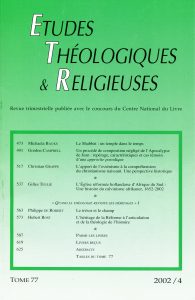Dans l’Oeuvre sacerdotale, le Shabbat est conçu comme septième jour qui remplace, depuis l’époque exilique, l’ancienne fête de la pleine lune. Le changement de connotation du terme semble même avoir été initié par cette oeuvre. C’est ce qui apparaît à la faveur d’une comparaison avec le livre d’Ézéchiel, où le Shabbat joue un rôle tout à fait secondaire. Il semble qu’Ézéchiel lui-même ait encore considéré le Shabbat comme fête de la pleine lune et que les insertions des Shabbats hebdomadaires dans son livre soient dues à des rédactions tardives. Pour Michaela Bauks, c’est l’auteur de l’Oeuvre sacerdotale qui a créé le Shabbat hebdomadaire au moment de l’exil.
Cette étude est la leçon prononcée le 6 novembre 2001 à la Faculté de théologie protestante de Montpellier lors de sa session de rentrée.
In the Sacerdotal Works, the Sabbath is regarded as the seventh day that has come to replace the old festival celebrating the full moon, since the days of exile. Such a shift in meaning appears to have occurred for the first time in this very work. It becomes rather striking if one compares it with the Book of Ezekiel chere the Sabbath remains mostly secondary. Ezekiel himself may have regarded the Sabbath as a full moon festival and the occurrences of weekly Sabbaths in his Book were presumably the result of later rewritings. According to Michaela Bauks, the Sacerdotal Works established the weekly celebration of the Sabbath at the time of exile.
p.473-490
Auteur
BAUKS Michaela
Michaela BAUKS est professeur d'histoire de l'Ancien Testament et de religion à l'université de Coblence (Allemagne)..
